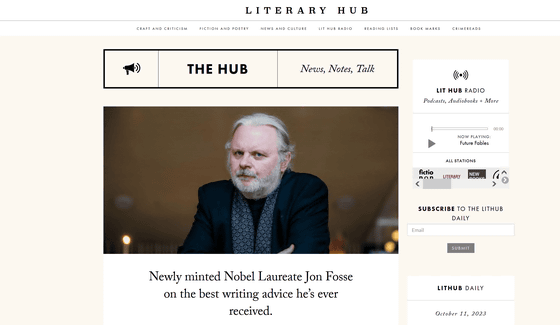What is the ``most important advice regarding writing'' from Jon Fosse, winner of the Nobel Prize in Literature?

Norwegian playwright Jon Fosse has been awarded the 2023
Newly minted Nobel Laureate Jon Fosse on the best writing advice he's ever received. ‹ Literary Hub
https://lithub.com/newly-minted-nobel-laureate-jon-fosse-on-the-best-writing-advice-hes-ever-received/

Meet the 2022 National Book Award Finalists ‹ Literary Hub
https://lithub.com/meet-the-2022-national-book-award-finalists/

On October 5, 2023, the Swedish Academy awarded playwright Jon Fosse the Nobel Prize in Literature for his 'innovative plays and prose that give voice to the ineffable.'

In 2022, Jon Fosse was shortlisted for the Translated Literature category of

First, regarding his writing life, Fosse says that writing is 'more or less a conscious dream,' adding, 'I always write as soon as I wake up, so that I can go straight from sleep, where I have dreams or nightmares, to writing.' I like to start writing in the beginning.' Also, when asked, ``How many hours do you write per day?'', the answer was ``I used to have a habit of writing from around 8 in the morning until around 1 or 2 in the afternoon.For the past 10 or 15 years, For the last year or so, I wake up earlier, start writing at around 5 a.m. when it's still dark, and finish around 9 or 10 a.m. I sometimes write in the afternoon, but most of the time it's just small revisions. ” is the answer.
Next, Literary Hub asked if they had ever experienced ` `writer's block, '' a slump in which they were unable to produce new work or the quality of their work did not improve. Writer's block is known to be a psychological problem rather than a lack of skill or experience, and can be experienced even by famous and successful writers, but Fosse, who has 40 years of experience as a writer, He says he has never experienced writer's block.

Mr. Fosse cites two self-analysis points as the reason why he is able to continue writing without experiencing writer's block. The first point is, ``After writing your own text for a certain period of time, take a break and do something else during the other period.'' After publishing his debut novel at the age of 23, Mr. Fosse worked not only as a writer but also as a reader. In addition, he was sometimes entrusted with the preface of books and wrote essays, and during his breaks he worked on translating works and wrote as a playwright.
Second, over the past few years, Mr. Fosse has adopted a writing method of ``writing by hand in a notebook made of good paper, using a good fountain pen, and switching between pen and ink.'' He talks about the advantage of being able to write anywhere.
Finally, Mr. Fosse answers the question, 'What is the best writing advice you have ever received?' When Fosse published his debut novel, Red, Black , he received a lot of bad reviews and was troubled by it.He said, ``If I had listened to those opinions, I would have written I would have stopped doing it,' he said. Since then, Mr. Fosse has made it his rule to ``listen to your own voice, not the opinions of others'' as the best advice he has learned from his own life. Rather than what someone else wants or what you wish you had, 'stick to what you have, listen to your own inner voice and vision, and decide what you want your writing to be.' Pursue it,” Fosse said.

``Listen to your own voice, not the opinions of others'' does not only mean not listening to bad opinions, but also applies to good opinions. Mr. Fosse says, ``My writing has been well received in recent years and I have won many awards, but I try not to let that affect my writing.'' The key to being able to continue writing is not being influenced by other people's opinions, sticking to what I can do and what I feel I need to write about, rather than what I want to do, and returning to the starting point no matter how many times I stop. Mr. Fosse summarizes.
Related Posts:
in Note, Posted by log1e_dh







